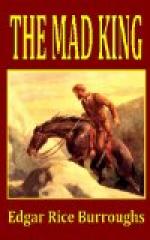“Good, Coblich! Maenck is a most intelligent and loyal officer. We must reward him well. A baronetcy, at least, if he handles this matter well,” said Peter. “It might not be a bad plan to hint at as much to him, Coblich.”
And so it happened that shortly thereafter Captain Ernst Maenck, in command of a troop of the Royal Horse Guards of Lutha, set out toward the Old Forest, which lies beyond the mountains that are visible upon the other side of the plain stretching out before Lustadt. At the same time other troopers rode in many directions along the highways and byways of Lutha, tacking placards upon trees and fence posts and beside the doors of every little rural post office.
The placard told of the escape of the mad king, offering a large reward for his safe return to Blentz.
It was the last paragraph especially which caused a young man, the following day in the little hamlet of Tafelberg, to whistle as he carefully read it over.
“I am glad that I am not the mad king of Lutha,” he said as he paid the storekeeper for the gasoline he had just purchased and stepped into the gray roadster for whose greedy maw it was destined.
“Why, mein Herr?” asked the man.
“This notice practically gives immunity to whoever shoots down the king,” replied the traveler. “Worse still, it gives such an account of the maniacal ferocity of the fugitive as to warrant anyone in shooting him on sight.”
As the young man spoke the storekeeper had examined his face closely for the first time. A shrewd look came into the man’s ordinarily stolid countenance. He leaned forward quite close to the other’s ear.
“We of Lutha,” he whispered, “love our ’mad king’—no reward could be offered that would tempt us to betray him. Even in self-protection we would not kill him, we of the mountains who remember him as a boy and loved his father and his grandfather, before him.
“But there are the scum of the low country in the army these days, who would do anything for money, and it is these that the king must guard against. I could not help but note that mein Herr spoke too perfect German for a foreigner. Were I in mein Herr’s place, I should speak mostly the English, and, too, I should shave off the ‘full, reddish-brown beard.’”
Whereupon the storekeeper turned hastily back into his shop, leaving Barney Custer of Beatrice, Nebraska, U.S.A., to wonder if all the inhabitants of Lutha were afflicted with a mental disorder similar to that of the unfortunate ruler.
“I don’t wonder,” soliloquized the young man, “that he advised me to shave off this ridiculous crop of alfalfa. Hang election bets, anyway; if things had gone half right I shouldn’t have had to wear this badge of idiocy. And to think that it’s got to be for a whole month longer! A year’s a mighty long while at best, but a year in company with a full set of red whiskers is an eternity.”




